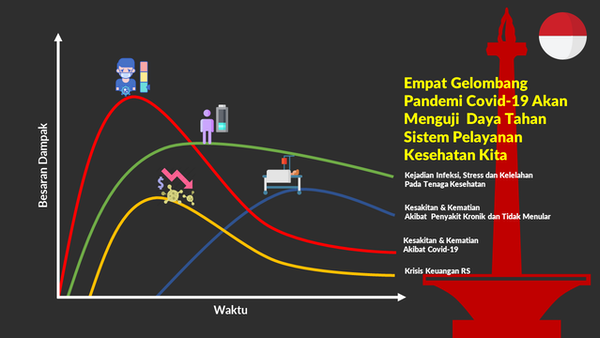4 MAJOR WAVES OF THE COVID-19 PANDEMIC HIT THE HEALTH CARE SYSTEM

July 16, 2020
Currently, the Covid-19 pandemic is testing the resilience of health care systems around the world, including Indonesia. The ability to respond quickly and appropriately is the key so that we can get through this crisis well.
As of July 15, Covid-19 cases in this country have reached around 80,000 cases and daily cases continue to grow . This figure has almost caught up with the number of cases in China when it reached its peak of transmission (around 85,000 cases) and the figure there has been steadily declining since last March .
Therefore, the government, local governments, the hospital industry, hospital associations, and hospital managers must be prepared to respond to a series of waves of the current and future Covid-19 pandemic.
The latest survey by the World Health Organization shows that health services for people who need examination and treatment other than Covid cases have been disrupted due to the corona virus.
More than half (53%) of the 155 countries surveyed stated that access to and public services for hypertension treatment was delayed. Similar effects were seen in 49% for diabetes treatment and diabetes-related complications, 42% for cancer treatment, and 31% for cardiovascular emergencies. Even prevention programs such as screening (breast and cervical cancer) are also disrupted in more than 50% of countries.
As a major health disaster, I predict at least this pandemic will hit Indonesia's health care system in four major waves.
FIRST WAVE
The wave of illness and death due to Covid-19 is the first wave.
In Indonesia, this wave began in early March with the finding of two positive cases. As of July 13, 2020, the cases have grown to 76,981 cases with 3,656 deaths.
This first wave is expected to continue to hit the health care system for a long time. Moreover, there are recent study findings which state that a person has the " potential " to be able to contract the corona virus many times.
President Joko Widodo said the peak of new Covid-19 cases would occur in August-September.
SECOND WAVE
The second wave is the hospital financial crisis.
It started in April, when the Ministry of Health issued a policy for hospitals to reduce routine practice services except in emergency conditions . At the same time, people are also limiting visits to hospitals for fear of contracting Covid-19 .
This policy and phenomenon resulted in a significant decrease in the number of patients seeking treatment at the hospital and as a result, hospital revenues fell.
The decline in income has become even more severe, because at the same time hospital expenses have actually increased . Hospitals must equip infrastructure and equipment to deal with the increasing pandemic attack.
The East Java government even ran out of budget to finance the operation of a special hospital for Covid-19 patients due to the large expenditure to deal with the pandemic. The average cost of treatment per Covid-19 patient is IDR 50 million .
Some hospitals began to make efficiency by laying off employees. Faisal Islamic Hospital in Makassar City has temporarily laid off 157 employees due to a significant drop in visits by around 80-90%. Furthermore, 80 volunteers at Lasinrang Pinrang Hospital were also forced to be laid off because the number of patients had decreased by up to 70% compared to the normal situation.
Major national hospital companies also felt the impact of this wave. Of the six hospital issuers listed on the Indonesia Stock Exchange , during the January 2-15 May 2020 range, all of the stock prices have fallen. Owners of Omni Hospital fell 51.26%, Mayapada Hospital fell 45.37%, Royal Prima Hospital fell 35.26%, Hermina Hospital fell 20.98%, Siloam Hospital fell 20.28%, and Mitra Keluarga Hospital also fell 12 ,77%.
The impact of this second wave is expected to continue to increase following the increase in Covid-19 cases. Their stock graph will only crawl when Covid-19 cases have decreased and/or public confidence in going to the hospital has improved.
THIRD WAVE
The next wave is an increase in infection rates, stress, and fatigue of health workers.
A literature study found that the prevalence of anxiety that afflicted health workers during the Covid-19 pandemic was quite large (23.2%) and those who experienced depression were 22.8% of the total 33,062 sample of health workers.
Another study in Singapore and India with 906 respondents found that 5.3% of health workers there were depressed.
In Indonesia, research results show that around 66% of respondents from 644 health workers experience anxiety, 55% stress and 23.5% depression due to Covid-19.
This wave is expected to hit health services with the longest duration of time compared to other waves.
As of June, it is predicted that globally more than 90,000 health workers have been infected with Covid-19. In Indonesia, data on the number of infected health workers are not yet available .
It is predicted that thousands of health workers have been infected because in East Java alone, it was reported that up to July 12, 277 nurses had been infected . This is not yet another type of health worker as well as cases in other provinces.
During the pandemic, health workers work long hours in a tough environment. There are many potential traumas that they have to face. Like they are traumatized by patients or their co-workers who died, fear of contracting or transmitting to their families. There is also public pressure for them to provide the best service, to a lack of experience or equipment.
In the future, the workload of health workers is also predicted to increase sharply. This is because of the double burden that will be faced when the fourth wave begins to hit when the other waves have not subsided.
This condition will cause fatigue and stress .
FOURTH WAVE
The increase in morbidity and mortality from chronic diseases is the fourth wave. In contrast to the previous three waves that have begun to be felt, the fourth wave may not have been hit too hard.
This wave occurred because during the pandemic, there was a phenomenon of delay in seeking treatment for people with chronic diseases such as cancer , heart disease , kidney failure and stroke.
In the long term, delaying the treatment can have serious consequences because of the severity of the pain.
Globally, according to BBC research data , 130,000 non-Covid 19 patients died because they did not receive proper health care.
For Indonesia, there is no data regarding the number of people who have died as an indirect result of the corona virus outbreak.
However, several cases of death suspected to be an indirect result of the pandemic have occurred in the community, such as the case of a child in Ambon who died because he had to go back and forth in several hospitals for treatment , a pregnant woman in Makassar who miscarried , to a kidney failure patient in Jabodetabek who died. allegedly due to the delay in getting dialysis services .
GET READY EARLY
The government and hospital stakeholders must begin to prepare with appropriate and fast responses to face the blows of these four waves. Strategies must begin to be formulated and implemented immediately, so that the health care system does not collapse.
The main strategy is to immediately suppress the growth of new Covid-19 cases in the community so that hospitals are not overwhelmed with accommodating patients. Furthermore, the government and hospital management must start thinking about strategies so that access for people who need health services is not hampered due to the pandemic.
Rebuild public trust so that they are not afraid to access health services when they need it. Of course, this must be followed by the safety protection provided by the government and hospitals to the community.
Separating infectious and non-infectious services or establishing special infection hospitals in various regions and accelerating the implementation and regulatory support for telemedicine services are strategies that can be taken.
Obtained from:
https://theconversation.com/4-gelombang-besar-pandemi-covid-19-menghantam-sistem-pelayanan-kesehatan-142049

